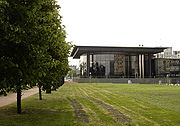
Landtag of Saxony
Encyclopedia

Landtag
A Landtag is a representative assembly or parliament in German-speaking countries with some legislative authority.- Name :...
of Saxony, also referred to as the Parliament of Saxony or the Saxon Parliament, is the German state of Saxony
Saxony
The Free State of Saxony is a landlocked state of Germany, contingent with Brandenburg, Saxony Anhalt, Thuringia, Bavaria, the Czech Republic and Poland. It is the tenth-largest German state in area, with of Germany's sixteen states....
's legislature. It is based on the Constitution of the Free State of Saxony, drafted in 1992.
History
Some form of a Landtag has existed in the state of Saxony or its predecessors since the 15th century, and a modern-style bicameral constitutionally-based legislature was introduced in 1831. In the wake of the tumultuous 1848 revolutions, Saxony's Landtag extended voting rights (though still maintaining property requirements) and abolished voting-taxes. As the years went on, Saxony was incorporated into the German Empire and more voting rights were gradually extended.By the early 1900s, Saxony's local politics had settled into a niche in which Social-Democrats (predecessors to today's SPD
Social Democratic Party of Germany
The Social Democratic Party of Germany is a social-democratic political party in Germany...
), Conservatives (predecessors to today's CDU
Christian Democratic Union (Germany)
The Christian Democratic Union of Germany is a Christian democratic and conservative political party in Germany. It is regarded as on the centre-right of the German political spectrum...
), and so-called National-Liberals (who have no ideological descendants today; perhaps a fusion of FDP
Free Democratic Party (Germany)
The Free Democratic Party , abbreviated to FDP, is a centre-right classical liberal political party in Germany. It is led by Philipp Rösler and currently serves as the junior coalition partner to the Union in the German federal government...
free-marketism and the NPD
NPD
NPD may refer to:* National Democratic Party of Germany, a far-right political party in Germany; after its German language name, Nationaldemokratische Partei Deutschlands...
's voelkisch ideals) were splitting the share of votes and Landtag seats three ways. (In 1909: Social-Democrats won 27% of seats, Conservatives won 31% of seats, "National-Liberals" won 31% of seats). Voter participation was high (82% in 1909).
The post-WWI era saw local politics in Saxony mirror the tumultuousness befalling all of European politics at the time. The Saxon Landtag election of 1930 saw the Social-Democrats winning 33% of seats, the National-Socialists 15%, the Communists 14%, a free-market-liberal party (Reichspartei des deutschen Mittelstandes) 10%, "National-liberals" (Deutschnationale Volkspartei) 8%, and a number of mostly local and right-wing populist parties winning the remaining 16%. Turnout was unenthusiastic, at 73%.
The Landtag elections of March 5, 1933 saw unprecedented turnout of 92%. The National-Socialists won 45%, the Social-Democrats 26%, the Communists 16%, National-liberals (Deutschnationale Volkspartei) 7%, and minor parties taking only 6% of seats. This was the final free election in Saxony until 1990.
See Saxony Landtag elections in the Weimar Republic
Saxony Landtag Elections in the Weimar Republic
-1919:-1920:-1922:-1926:-1929:-1930:...
.
Since 1990, the CDU has been in government in the Saxon Landtag and has usually won most of the votes. This changed in 2004.
Current Composition
The results of the most recent 2009 Landtag electionsSaxony state election, 2009
State elections took place in Saxony on 30 August 2009, the same day as the Saarland and Thuringia state elections. The election results decided control of the Landtag of Saxony...
were as follows:
Elections are conducted using a proportional representation
Proportional representation
Proportional representation is a concept in voting systems used to elect an assembly or council. PR means that the number of seats won by a party or group of candidates is proportionate to the number of votes received. For example, under a PR voting system if 30% of voters support a particular...
system, with a minimum of 5% vote share to receive any seats.
The next scheduled Saxon Landtag election is in 2014.

